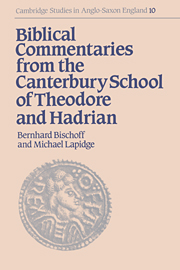Book contents
- Frontmatter
- Contents
- Preface
- List of abbreviations
- 1 Introduction
- 2 Archbishop Theodore
- 3 Abbot Hadrian
- 4 Theodore and Hadrian in England
- 5 The sources of the Canterbury biblical commentaries
- 6 The nature of the Canterbury biblical commentaries
- 7 The manuscripts
- Texts and translations
- Commentary to the texts
- Appendix I Additional manuscript witnesses to the Milan biblical commentaries
- Appendix II Two metrological treatises from the school of Canterbury
- Fig. 1 Cilicia and Syria
- Fig. 2 Constantinople in the seventh century
- Fig. 3 Churches and monasteries of seventh-century Rome
- Fig. 4 Cyrenaica and the Pentapolis
- Fig. 5 Campania and the Bay of Naples
- Fig. 6 Palestine
- Bibliography
- Index of Old English words quoted in the texts
- Index of Greek words quoted in the texts
- Index of names cited in the texts
- General index
3 - Abbot Hadrian
Published online by Cambridge University Press: 08 January 2010
- Frontmatter
- Contents
- Preface
- List of abbreviations
- 1 Introduction
- 2 Archbishop Theodore
- 3 Abbot Hadrian
- 4 Theodore and Hadrian in England
- 5 The sources of the Canterbury biblical commentaries
- 6 The nature of the Canterbury biblical commentaries
- 7 The manuscripts
- Texts and translations
- Commentary to the texts
- Appendix I Additional manuscript witnesses to the Milan biblical commentaries
- Appendix II Two metrological treatises from the school of Canterbury
- Fig. 1 Cilicia and Syria
- Fig. 2 Constantinople in the seventh century
- Fig. 3 Churches and monasteries of seventh-century Rome
- Fig. 4 Cyrenaica and the Pentapolis
- Fig. 5 Campania and the Bay of Naples
- Fig. 6 Palestine
- Bibliography
- Index of Old English words quoted in the texts
- Index of Greek words quoted in the texts
- Index of names cited in the texts
- General index
Summary
The companion of Archbishop Theodore's journey to England, and of his archiepiscopacy at Canterbury, was Hadrian, who became abbot of the monastery of SS Peter and Paul (later St Augustine's) in Canterbury on his arrival in (probably) 670, and held that appointment until his death, probably in 709. Although their origins were different, they both spoke Greek as their native language and they shared a common Mediterranean background and outlook. They must have known one another before coming to England, because it was Hadrian who suggested Theodore's name to Pope Vitalian as a possible candidate for the vacant see of Canterbury. Once in England, their common language and background will have drawn and kept them together as strangers in a foreign land. From English sources, principally Bede and Aldhelm, we learn that they were inseparable companions. On his initial tour of Britain, Theodore was, in Bede's words, ‘accompanied everywhere and assisted by Hadrian’ (per omnia comitante et cooperante Hadriano), and this close association is reflected in the teaching of their Canterbury school, and in particular in the biblical commentaries printed below, where it is practically impossible to distinguish one authority from the other, except in the rare cases where one of them is named. As in the case of Theodore, our principal source for Hadrian's career is Bede, but – as also in the case of Theodore – evidence in the biblical commentaries may be used to supplement Bede's account and to permit various new inferences about the course of that career before Hadrian's arrival in England in 670.
We may best begin with the biographical information given by Bede.
- Type
- Chapter
- Information
- Publisher: Cambridge University PressPrint publication year: 1995

